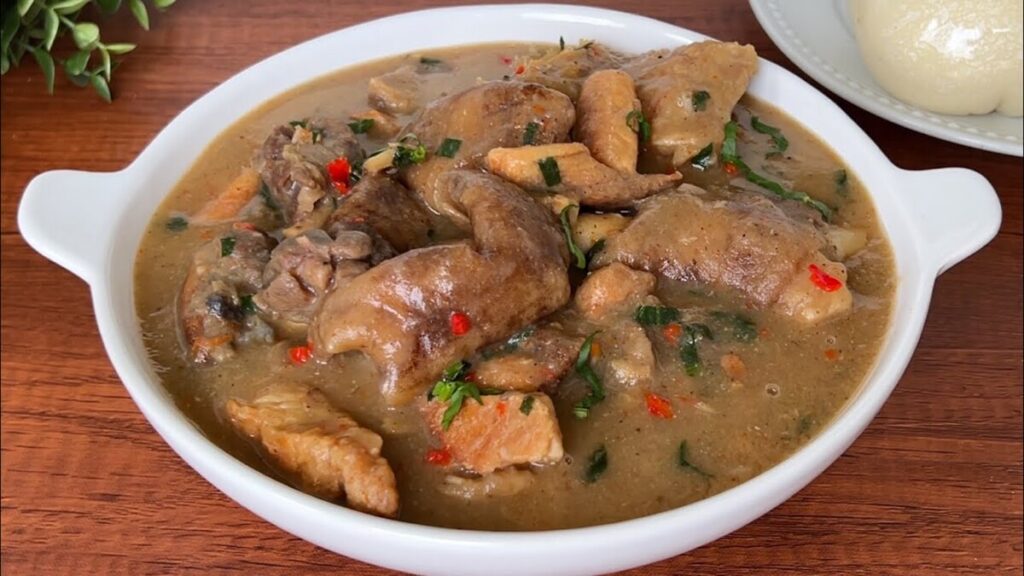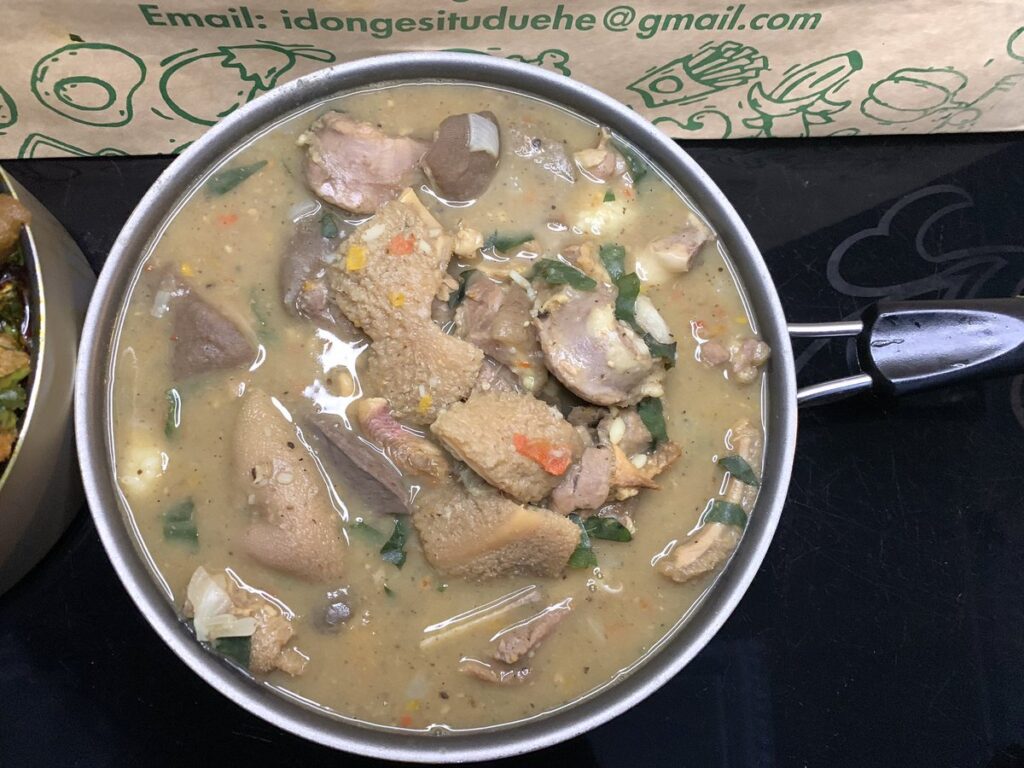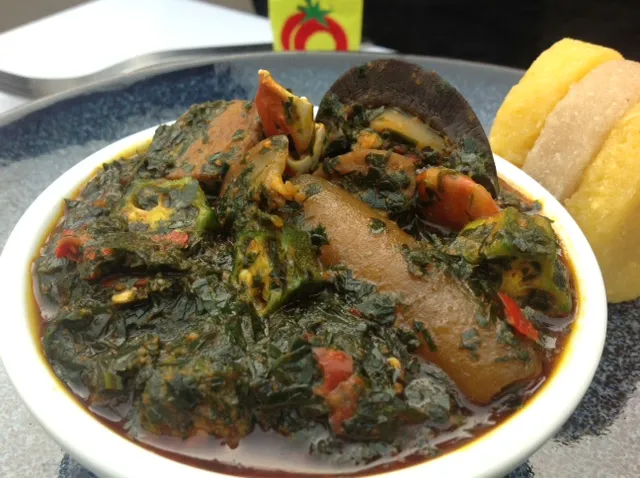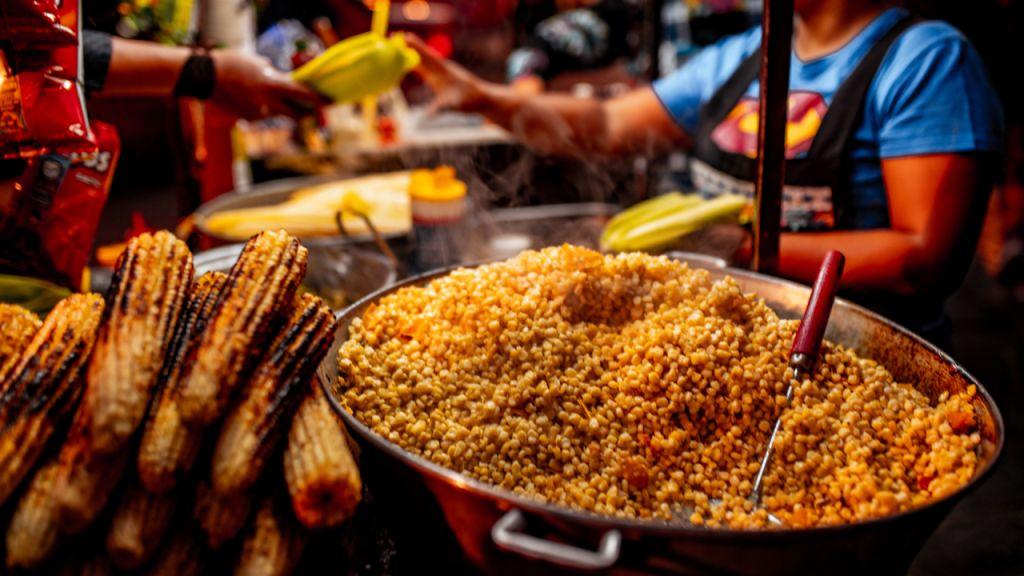When it comes to Nigerian cuisine, few regions can match the culinary richness of Akwa Ibom State and Cross River State. Nestled in the lush, fertile South-South region, these states boast bountiful farmlands, abundant rivers, and a deep tradition of cooking with fresh, locally sourced ingredients. Their food is not just about taste—it’s a celebration of culture, hospitality, and community.
Why Their Cuisine Stands Out
The cooking traditions of Akwa Ibom and Cross River are shaped by:
- Fresh produce from rain-fed farmlands and rivers.
- Seafood abundance from the Atlantic coastline and inland waterways.
- Generous use of vegetables for both flavor and health.
- Palm oil richness, which gives many dishes their vibrant color and deep flavor.
Meals here are often served generously, symbolizing the people’s warm hospitality.
Signature Delicacies

1. Edikang Ikong Soup
- Origin: Ibibio/Efik
- Description: A nutrient-packed vegetable soup made with fluted pumpkin leaves (ugu) and waterleaf. Loaded with assorted meats, stockfish, and sometimes snails, this soup is both hearty and healthy.
- Fun Fact: Considered a “royalty” dish—traditionally served to guests as a mark of honor.

2. Afang Soup
- Origin: Ibibio, Efik, and Oron people
- Description: Made from finely sliced afang leaves (wild spinach) and waterleaf, simmered with seafood, meat, and palm oil. Its slightly bitter taste is balanced by the richness of the ingredients.
- Best Served With: Fufu, garri, or pounded yam.

3. Ekpang Nkukwo
- Origin: Ibibio, Efik, and Oron
- Description: Grated cocoyam wrapped in cocoyam leaves, cooked with smoked fish, periwinkles, and palm oil. This dish is labor-intensive but worth every bite.
- Unique Element: Periwinkles are often cooked in their shells, adding a rich seafood aroma.

4. Afia Efere (White Soup)
- Origin: Efik
- Description: A light, peppery soup without palm oil, thickened with ground yam or cocoyam. Often cooked with goat meat, chicken, or fish.
- Occasions: Popular at traditional weddings and festive gatherings.

5. Afia Efere Ebot (Goat White Soup)
- Origin: Efik and Ibibio
- Description: A spicy variant of white soup made specifically with goat meat, flavored with traditional spices for a distinct aroma.

6. Fisherman Soup
- Origin: Coastal communities of both states
- Description: A rich seafood soup made with fresh fish, crabs, prawns, periwinkles, and sometimes lobster. Cooked in a spicy broth with thickening from ground yam or cocoyam.
- Why It’s Special: It reflects the maritime heritage of these states.

7. Editan Soup
- Origin: Ibibio and Efik
- Description: Made from editan leaves, which have a slightly bitter taste. The leaves are carefully washed to reduce bitterness, then cooked with meat, seafood, and palm oil.
- Health Note: Believed to have medicinal properties.

8. Afere Atama (Atama Soup)
- Origin: Oron people
- Description: Made from atama leaves, fresh or smoked fish, and palm fruit extract. Known for its aromatic, slightly tangy flavor.

9. Afere Nkong (Okra Soup)
- Origin: Widely enjoyed in both states
- Description: Fresh okra simmered with seafood or meat, often with a hint of pepper and palm oil. Served with garri, semovita, or fufu.

10. Local Snacks and Street Foods
- Ekpan – A fermented corn pudding often paired with fresh fish sauce.
- Ukodo – Yam pepper soup, perfect for rainy days.
- Plantain dishes – Fried ripe plantains (dodo), boiled unripe plantain with vegetable sauce, or roasted plantains with spicy pepper sauce.
Cultural Significance of Food
In both Akwa Ibom and Cross River:
- Food equals love. It’s common for visitors to be served large portions, whether they’re staying for hours or just passing by.
- Cooking is communal. Big dishes like Ekpang Nkukwo often involve the whole family in preparation.
- Festivals and ceremonies are incomplete without a spread of traditional soups and fresh seafood.
Conclusion
The delicacies of Akwa Ibom and Cross River States are more than just meals—they are edible stories of the people’s history, environment, and values. From the vegetable-rich Edikang Ikong to the ocean-inspired Fisherman Soup, every dish is a taste of culture and heritage.
If you ever visit these states, come hungry—you’ll leave with a full stomach, a warm heart, and a deep appreciation for one of Nigeria’s most flavorful cuisines.
